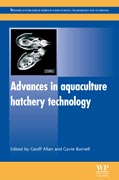
Aquaculture is the fastest-growing food production sector in the world. With demand for seafood increasing at astonishing rates, the optimization of production methods is vital. One of the primary restrictions to continued growth is the supply of juveniles from hatcheries. Addressing these constraints, Advances in aquaculture hatchery technology provides a comprehensive, systematic guide to the use of current and emerging technologies in enhancing hatchery production.Part one reviews reproduction and larval rearing. Aquaculture hatchery water supply and treatment systems, principles of finfish broodstock management, genome preservation, and varied aspects of nutrition and feeding are discussed in addition to larval health management and microbial management for bacterial pathogen control. Closing the life-cycle and overcoming challenges in hatchery production for selected invertebrate species are the focus of part two, and advances in hatchery technology for spiny lobsters, shrimp, blue mussel, sea cucumbers and cephalopods are all discussed. Part three concentrates on challenges and successes in closing the life-cycle and hatchery production for selected fish species, including tuna, striped catfish, meagre, and yellowtail kingfish. Finally, part four explores aquaculture hatcheries for conservation and education.With its distinguished editors and international team of expert contributors, Advances in aquaculture hatchery technology is an authoritative review of the field for hatchery operators, scientists, marine conservators and educators. Provides a comprehensive guide to the use of technologies in enhancing hatchery productionExamines reproduction and larval rearing, including genetic improvement and microdietsDiscusses challenges in hatchery production of specific species INDICE: Part 1 Reproduction and larval rearing: Aquaculture hatchery water supply and treatment systems; Principles of finfish broodstock management in aquaculture: Control of reproduction and genetic improvement; Cryopreservation of gametes for aquaculture and alternative cell sources for genome preservation; Live microalgae as feeds in aquaculture hatcheries; Rotifers, Artemia and copepods as live feeds for fish larvae in aquaculture; Microdiets as alternatives to live feeds for fish larvae in aquaculture: Improving the efficiency of feed particle utilization; Management of finfish and shellfish larval health in aquaculture hatcheries; Microbial management for bacterial pathogen control in invertebrate aquaculture hatcheries. Part 2 Closing the life-cycle and overcoming challenges in hatchery production for selected invertebrate species: Palinurid lobster larval rearing for closed-cycle hatchery production; Biosecurity measures in specific pathogen free (SPF) shrimp hatcheries; Blue mussel hatchery technology in Europe; Research on the production of hatchery-reared juveniles of cephalopods with special reference to the common octopus (Octopus vulgaris); Jellyfish as products and problems of aquaculture; Sea cucumber aquaculture: Hatchery production, juvenile growth and industry challenges. Part 3 Closing the life-cycle and overcoming challenges in hatchery production for selected fish species: Closed-cycle hatchery production of tuna; Developments in hatchery technology for striped catfish (Pangasianodon hypophthalmus); Aquaculture production of meagre (Argyrosomus regius): Hatchery techniques, ongrowing and market; Hatchery production of yellowtail kingfish (Seriola lalandi). Part 4 Aquaculture hatcheries for conservation and education: Hatchery production for conservation and stock enhancement: The case of Australian freshwater fish; Developing educational programs in partnership with aquaculture hatchery facilities.
- ISBN: 978-0-85709-119-2
- Editorial: Woodhead Publishing
- Encuadernacion: Cartoné
- Páginas: 690
- Fecha Publicación: 19/02/2013
- Nº Volúmenes: 1
- Idioma: Inglés
